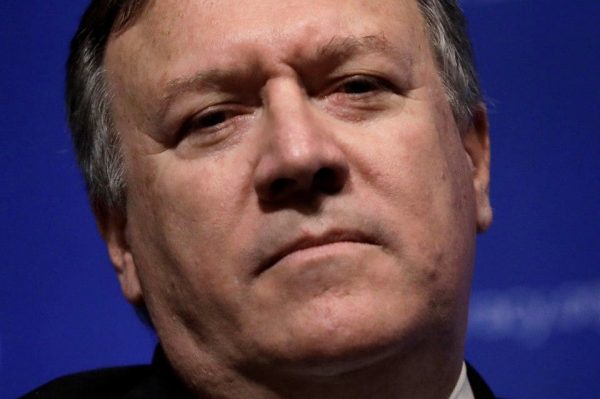
Secretary of State Mike Pompeo said Sunday that the United States is “considering a full range of options” regarding rising tensions with Iran, including military options, but emphasized that President Donald Trump has said that he does not want to go to war.
“The United States is considering a full range of options. We have briefed the President a couple of times, we’ll continue to keep him updated. We are confident that we can take a set of actions that can restore deterrence which is our mission set,” Pompeo said in an interview on CBS “Face the Nation.”
When asked if a military response was included in that set of actions, Pompeo responded, “Of course.”
“The President will consider everything we need to do to make sure, right? But what’s the President said? We don’t want Iran to get a nuclear weapon,” Pompeo added. “President Trump has said very clearly, he doesn’t want to go to war.”
Pompeo’s comments come as tensions are rising in the waterways of the Middle East, where two tankers — one carrying oil and the other transporting chemicals — were attacked near the strategically important Strait of Hormuz, a vital shipping route that has been the focal point of regional tensions for decades. Roughly 30% of the world’s sea-borne crude oil passes through the strategic choke point, making it a flashpoint for political and economic friction.
Iran has categorically denied the attacks.
The United States has blamed Iran for the attack on the tankers in the Gulf of Oman, releasing video footage that it claims shows an Iranian patrol boat removing an unexploded mine from one of the vessels’ hulls.
Larijani mocked remarks by Pompeo, who urged Iran to “meet diplomacy with diplomacy.”
“Is it diplomacy to start a face-off with a revolutionary nation with acts of economic terrorism, [economic sanctions] which they themselves call the toughest ever?” Larijani said. “Is it diplomacy, Mr. Pompeo, to renege on one’s promises in the nuclear agreement?”
British Defense Minister Tobias Ellwood said Sunday that “tensions” in Iran “are a concern for us all,” in an interview with Sky News’ Sophy Ridge.
Ellwood said that while he understands Iran’s frustrations over the nuclear deal, “that does not give license to start attacking ships.” In a statement Friday, Britain’s Foreign Office said it was “almost certain” that the Iranian Revolutionary Guard Corps (IRGC) were behind the attacks.
Saudi Crown Prince Mohammed bin Salman has also blamed Iran for the attacks on the ships, calling on the international community to take a “firm stand towards an exponential regime that supports terrorism and spreads killing and destruction.”
When pressed Sunday on legal authorization to strike Iran, Pompeo said that the administration “always” has the authorization to “defend American interests.”
In the US Constitution, Article I grants Congress the power to declare war, while the President derives the power to direct the military from Article II, which names the President commander-in-chief of the armed forces. In the lead up to the Iraq War, the effort to pass an Authorization for Use of Military Force (AUMF) in Congress became a point of contention, and once again became an issue during the US military campaign against ISIS.
Ultimately, Congress never took a full vote on an ISIS war authorization.
“It was them that did it,” Trump said on Fox and Friends on Friday, referring to Iran.
“We will see what happens. We are being very tough on sanctions … We’re going to see how to stop (it),” Trump said, before claiming that because of his policies “they are pulling back from everywhere.”
Pompeo also said Sunday on Fox that “President Trump has done everything he can to avoid war — we don’t want a war,” adding, “We’ve done what we can to deter this. The Iranians should understand very clearly that we will continue to take actions that deter Iran from engaging in this kind of behavior.”
Iran will release “significant” information on Monday regarding the scaling back of its commitments to the nuclear deal, the Joint Comprehensive Plan of Action (JCPOA), according to Iran’s semi-official news agency, Tasnim on Sunday.
CNN

Leave a Reply
You must be logged in to post a comment.